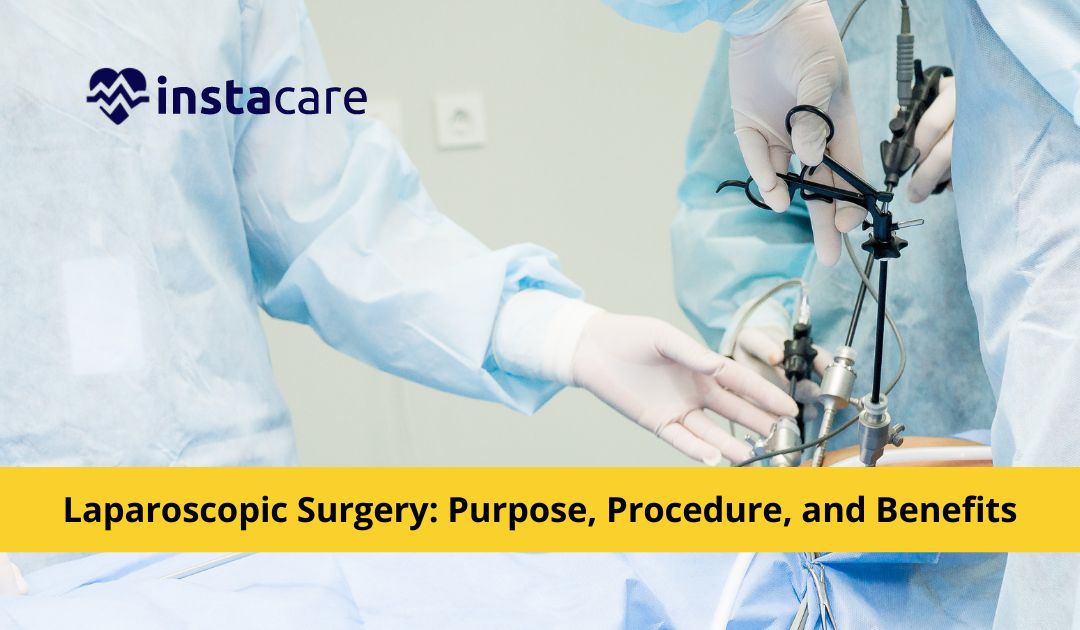If you're considering laparoscopic surgery, it can be daunting to get a handle on all of the information about it. However, with this guide to laparoscopic surgery, we'll give you an overview of what to expect from the procedure and provide you with some invaluable tips for getting the most out of your experience. We'll explain exactly what is involved in laparoscopic surgery and familiarize ourselves with its benefits, risks and common side effects so that you can have an informed discussion with your surgeon before making any decisions. Whether you're exploring options for treating chronic illness or just curious about how tiny cameras are inserted into your abdominal cavity to perform delicate operations - we've got everything covered!
What it laparoscopic surgery and how it works
Laparoscopic surgery, often referred to as minimally invasive surgery, is an advanced surgical technique that has revolutionized the way various abdominal and pelvic procedures are performed. This innovative approach utilizes small incisions, specialized instrumentation, and a miniature camera (laparoscope) to view the internal organs, allowing surgeons to perform complex surgeries with minimal trauma to the patient.
The laparoscope is a long, thin tool equipped with a light source and camera, which projects magnified images onto a monitor for the surgeon to analyze. This enables the surgical team to conduct precise removal, repair, or adjustment to the targeted area, while reducing scarring, pain, and recovery time for the patient. By offering shorter hospital stays, decreased risk of complications, and an overall improvement in patient experience, laparoscopic surgery has quickly become a preferred choice among many health professionals worldwide.
Benefits of laparoscopic surgery
Laparoscopic surgery, also known as minimally invasive or keyhole surgery, has revolutionized the medical field and brought immense benefits to patients in need of surgical procedures. With the use of small incisions and advanced camera technology, laparoscopic surgery provides a minimally invasive alternative to traditional open surgery, ensuring reduced blood loss, minimal scarring, and faster recovery times. The innovative nature of the procedure allows for a precise, targeted approach to treatment, while significantly reducing the risk of complications and infection.
Furthermore, patients often experience less postoperative pain and discomfort, contributing to improved overall satisfaction and quality of life. By offering a safer, quicker, and less painful method for addressing a range of medical conditions, laparoscopic surgery continues to redefine the nature of surgical care and offers an impressive array of benefits to patients and medical professionals alike.
View More: How To Manage Pain After C-Section - A Comprehensive Guide
Risks of laparoscopic surgery
Laparoscopic surgery, often considered a minimally invasive procedure, has steadily gained popularity due to its numerous advantages, such as smaller incisions, less pain, and faster recovery time compared to traditional open surgeries. However, it's essential to be aware of the potential risks and complications that may arise during or after the procedure. Some of these risks include bleeding, infection, and damage to surrounding organs or blood vessels, often caused by the insertion and movement of surgical instruments.
In rare instances, complications such as blood clots, hernias, or an adverse reaction to anesthesia may arise, posing a serious threat to the patient's health. It is crucial to weigh these risks against the benefits of laparoscopic surgery and openly discuss possible complications with the surgical team to make an informed decision about this innovative, yet not entirely risk-free, medical approach.
Preparing for laparoscopic surgery
Laparoscopic surgery, often referred to as minimally invasive surgery, has revolutionized the world of medicine by providing patients with quicker recovery times and less pain than traditional open surgeries. Preparing for this type of surgical procedure can be a nerve-wracking experience, but rest assured that understanding what to expect and taking the necessary steps to prepare can greatly ease your anxiety. It is crucial to discuss your medical history and any medications you may be taking with your healthcare team, as they will provide guidance on how to safely adjust or discontinue their use prior to the surgery.
In addition, make sure to follow any specific preoperative instructions, such as fasting or bowel preparation, in order to reduce the risk of complications during the procedure. It's also a good idea to develop a post-operation recovery plan with your surgeon, detailing proper pain management, required lifestyle adjustments, and follow-up appointments to ensure a seamless healing process. Armed with this knowledge, you can confidently approach your laparoscopic surgery with an informed and proactive mindset.
The surgical procedure - step-by-step guide
Delving into the intricacies of a surgical procedure can be both fascinating and informative, as each step is meticulously planned and executed by a team of highly skilled professionals. From the initial consultation to the final stitch, the surgical journey is a testament to modern medical advancements and the unwavering dedication of healthcare workers. At the heart of this collaborative endeavor lies the surgeon, who leads the team through a systematic, step-by-step process to ensure the utmost precision and care for each patient. Preoperative preparations, surgical site marking, and anesthesia administration set the stage for a successful outcome, followed by the crucial moments of incision and dissection.
Throughout the procedure, the surgical team maintains constant communication, closely monitoring the patient's vital signs and seamlessly executing their respective roles. Once the primary surgical objective is achieved, the wound is meticulously closed and the patient is assisted through the recovery process, ultimately culminating in a well-executed, life-changing intervention.
Aftercare tips - how to recover quickly and safely
Post-treatment aftercare plays a crucial role in your healing process, ensuring a quick, safe, and efficient recovery from any medical procedure or treatment. It is vital to listen to and adhere to your healthcare provider's advice, as they have evaluated your specific needs and designed a customized aftercare plan for you. Throughout your recovery, rest and maintain proper nutrition, as both are essential building blocks to help your body regain its strength, optimize immunity, and heal.
Ensuring you take prescribed medications and follow wound care instructions will help prevent infections and further complications. Additionally, regular communication with your healthcare provider is essential to address any concerns or report changes in your condition. By diligently following these aftercare tips, you'll be well on your way to a swift and safe recovery.
Questions to ask your surgeon before undergoing laparoscopic surgery
Undergoing laparoscopic surgery can be an overwhelming experience. In order to put your mind at ease and ensure the best possible outcome, it is crucial to have a thorough conversation with your surgeon before the procedure. Make sure to ask about the specifics and benefits of the surgery, as well as potential risks and complications. Discuss the surgeon's experience in performing laparoscopic surgeries, as their expertise plays a significant role in the success of the procedure.
Moreover, inquire about the anesthesia to be used, the recovery process, and any lifestyle changes you may need to adopt post-surgery. Finally, don't forget to discuss the costs involved, the availability of support services, and any practical concerns you may have, such as insurance coverage, transportation, and family involvement. By asking these questions and gathering all the necessary information, you will be better prepared to make an informed decision and experience a smooth surgery and recovery.
View More: Is Horniness An Early Sign Of Pregnancy Or Menstruation A Guide For Women
Conclusion
Laparoscopic surgery is a minimally invasive procedure that is becoming increasingly popular. It can be used to treat many different conditions, from hernias and cysts to abdominal cancers, with great success rates. The most important thing for a beginner is to educate themselves about the potential risks and benefits of laparoscopic surgery prior to making a decision about it. Of course, consulting with your doctor for more information is always recommended as well.
While there can be some discomfort at times, overall laparoscopy should result in faster recovery and less post-operative pain than traditional open surgeries. Doing your research on laparoscopic procedures can ensure that you are informed and comfortable with any decisions you make.
Please book an appointment with the best Gynecologist in Lahore, Karachi, Islamabad, and all major cities of Pakistan through InstaCare, or call our helpline at 02137136090 to find the verified doctor for your disease.












